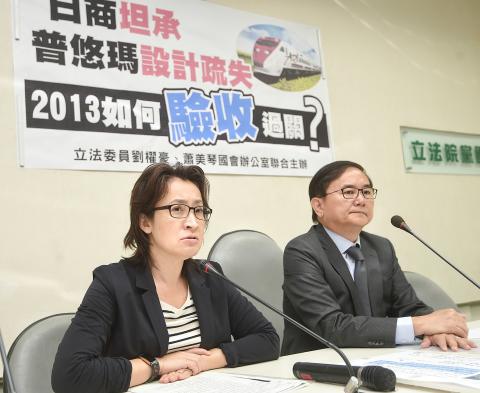Minister of Transportation and Communications Wu Hong-mo (吳宏謀) yesterday said that the ministry would investigate the Taiwan Railways Administration’s (TRA) procurement and evaluation process and whether it could seek compensation from the Japanese manufacturer of a train that derailed last month.
The remarks came after the TRA on Thursday said it had asked the company, Nippon Sharyo, to explain a design flaw in all 19 Puyuma trains it sold to Taiwan.
Puyuma Express No. 6432 derailed on Oct. 21, killing 18 people and injuring 215.

Photo: Fang Bin-chao, Taipei Times
If the company finds that the flaw can be fixed immediately, the ministry will ask for improvements and related system upgrades at once, Wu added.
TRA said it has sent a letter to Nippon Sharyo, a subsidiary of Central Japan Railway Co, and asked it to “make necessary arrangements.”
Japanese media outlets on Thursday said that Nippon Sharyo had discovered a design flaw in the trains that prevents the alert system from contacting the control station. As a result, train dispatchers are not aware when the automatic train protection (ATP) system, which prevents trains from speeding, is turned off, unless the driver informs them.
Nippon Sharyo did not double-check the feature before selling the trains to Taiwan and, because that model of train does not operate in Japan, was unaware of the flaw, the reports said.
The company said that if the TRA asked it to, it would conduct maintenance on the Puyuma trains and fix the problem, the reports said.
Nippon Sharyo was quoted in the reports as saying that this situation reflects problems with its internal quality control system, but added that it does not appear that the lack of connection between the train and control room was the direct cause of the derailment, as the driver did inform dispatchers that he had turned off the ATP system.
Speeding was to blame for the derailment, as the train from New Taipei City to Taitung left the tracks in Yilan while traveling at nearly twice the permissible speed, the reports said.
Separately at the Legislative Yuan yesterday, Democratic Progressive Party (DPP) Legislator Liu Chao-hao (劉櫂豪) said it made no sense that the ATP system had passed inspections in 2013 if it was riddled with problems.
At a joint news conference with DPP Legislator Hsiao Bi-khim (蕭美琴), Liu said that information should be preserved for future investigations, adding that the administrative branch of the TRA should begin talks with the Japanese company instead of exchanging letters.
There are still 17 Puyuma Express trains running, and the TRA, as well as the Ministry of Transportation and Communications, must launch investigations into faults admitted by the Japanese company, Liu said.
Currently operating units should not cause other incidents due to system shortcomings, Liu said.
Hsiao said that a general inquiry must be launched regarding the process of purchasing Puyuma trains to understand whether aspects had been irregularly handled.
The results of the investigation must be made known, even if no flaws are found, she said, adding that such transparency would allay fears harbored by travelers.
Steps must be taken to guarantee the safety of people traveling in the Hualien and Taitung areas, Hsiao added.

SECURITY: As China is ‘reshaping’ Hong Kong’s population, Taiwan must raise the eligibility threshold for applications from Hong Kongers, Chiu Chui-cheng said When Hong Kong and Macau citizens apply for residency in Taiwan, it would be under a new category that includes a “national security observation period,” Mainland Affairs Council (MAC) Minister Chiu Chui-cheng (邱垂正) said yesterday. President William Lai (賴清德) on March 13 announced 17 strategies to counter China’s aggression toward Taiwan, including incorporating national security considerations into the review process for residency applications from Hong Kong and Macau citizens. The situation in Hong Kong is constantly changing, Chiu said to media yesterday on the sidelines of the Taipei Technology Run hosted by the Taipei Neihu Technology Park Development Association. With

CARROT AND STICK: While unrelenting in its military threats, China attracted nearly 40,000 Taiwanese to over 400 business events last year Nearly 40,000 Taiwanese last year joined industry events in China, such as conferences and trade fairs, supported by the Chinese government, a study showed yesterday, as Beijing ramps up a charm offensive toward Taipei alongside military pressure. China has long taken a carrot-and-stick approach to Taiwan, threatening it with the prospect of military action while reaching out to those it believes are amenable to Beijing’s point of view. Taiwanese security officials are wary of what they see as Beijing’s influence campaigns to sway public opinion after Taipei and Beijing gradually resumed travel links halted by the COVID-19 pandemic, but the scale of

A US Marine Corps regiment equipped with Naval Strike Missiles (NSM) is set to participate in the upcoming Balikatan 25 exercise in the Luzon Strait, marking the system’s first-ever deployment in the Philippines. US and Philippine officials have separately confirmed that the Navy Marine Expeditionary Ship Interdiction System (NMESIS) — the mobile launch platform for the Naval Strike Missile — would take part in the joint exercise. The missiles are being deployed to “a strategic first island chain chokepoint” in the waters between Taiwan proper and the Philippines, US-based Naval News reported. “The Luzon Strait and Bashi Channel represent a critical access

Pope Francis is be laid to rest on Saturday after lying in state for three days in St Peter’s Basilica, where the faithful are expected to flock to pay their respects to history’s first Latin American pontiff. The cardinals met yesterday in the Vatican’s synod hall to chart the next steps before a conclave begins to choose Francis’ successor, as condolences poured in from around the world. According to current norms, the conclave must begin between May 5 and 10. The cardinals set the funeral for Saturday at 10am in St Peter’s Square, to be celebrated by the dean of the College